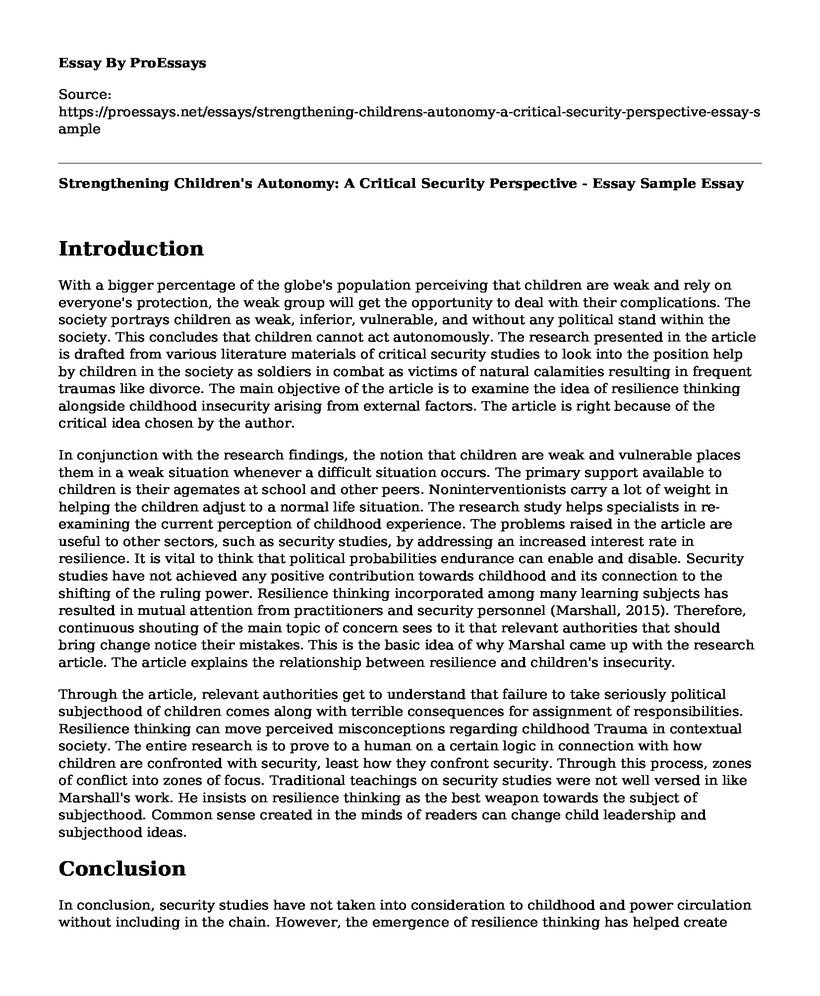Introduction
With a bigger percentage of the globe's population perceiving that children are weak and rely on everyone's protection, the weak group will get the opportunity to deal with their complications. The society portrays children as weak, inferior, vulnerable, and without any political stand within the society. This concludes that children cannot act autonomously. The research presented in the article is drafted from various literature materials of critical security studies to look into the position help by children in the society as soldiers in combat as victims of natural calamities resulting in frequent traumas like divorce. The main objective of the article is to examine the idea of resilience thinking alongside childhood insecurity arising from external factors. The article is right because of the critical idea chosen by the author.
In conjunction with the research findings, the notion that children are weak and vulnerable places them in a weak situation whenever a difficult situation occurs. The primary support available to children is their agemates at school and other peers. Noninterventionists carry a lot of weight in helping the children adjust to a normal life situation. The research study helps specialists in re-examining the current perception of childhood experience. The problems raised in the article are useful to other sectors, such as security studies, by addressing an increased interest rate in resilience. It is vital to think that political probabilities endurance can enable and disable. Security studies have not achieved any positive contribution towards childhood and its connection to the shifting of the ruling power. Resilience thinking incorporated among many learning subjects has resulted in mutual attention from practitioners and security personnel (Marshall, 2015). Therefore, continuous shouting of the main topic of concern sees to it that relevant authorities that should bring change notice their mistakes. This is the basic idea of why Marshal came up with the research article. The article explains the relationship between resilience and children's insecurity.
Through the article, relevant authorities get to understand that failure to take seriously political subjecthood of children comes along with terrible consequences for assignment of responsibilities. Resilience thinking can move perceived misconceptions regarding childhood Trauma in contextual society. The entire research is to prove to a human on a certain logic in connection with how children are confronted with security, least how they confront security. Through this process, zones of conflict into zones of focus. Traditional teachings on security studies were not well versed in like Marshall's work. He insists on resilience thinking as the best weapon towards the subject of subjecthood. Common sense created in the minds of readers can change child leadership and subjecthood ideas.
Conclusion
In conclusion, security studies have not taken into consideration to childhood and power circulation without including in the chain. However, the emergence of resilience thinking has helped create awareness and generate the attention of practitioners and scholars towards children's security. The article expounds on the idea of a connection between resilience and children's security, thereby creating awareness on children's insecurity. The implication of failing to take children's political subjecthood is elaborated with dire consequences mentioned. It acts as a forecast for human beings and warns them against political subjecthood. Impoverished conception, combined with resilience thinking, creates hope for children's security by acting as a mirror to other disciplines and fields of study. A cautionary talk about the author can help change the state of children's subjecthood.
References
Beier, J. M. (2015). Shifting the burden: childhoods, resilience, subjecthood. Critical Studies on Security, 3(3), 237-252.
Cite this page
Strengthening Children's Autonomy: A Critical Security Perspective - Essay Sample. (2023, May 18). Retrieved from https://proessays.net/essays/strengthening-childrens-autonomy-a-critical-security-perspective-essay-sample
If you are the original author of this essay and no longer wish to have it published on the ProEssays website, please click below to request its removal:
- Immigration Story
- What Can Be Done to Improve the College Graduation Rate? Essay
- Research Paper on Online Learning
- The Impacts of Immigration on Families and Children Paper Example
- Policy-Factors That Impact the Academic Success of College Students Essay
- Essay Example on What Is Intelligence? Exploring Different Theories
- Report Sample on Development in Education and Training







